Advice for Partners and Families
Perinatal Mental Health Service - A guide for partners and families
What has caused this mental health condition?
A new baby in a couple’s life is often a far greater life event than can be anticipated in terms of change and restrictions on previous lifestyle. This adjustment cannot be underestimated.
There is no single cause of antenatal/postnatal mental health. It could be a combination of physiological, psychological and social factors which become exacerbated by the perinatal period. The perinatal period includes pregnancy and the postnatal year.
Their mental health can show itself in terms of symptoms such as lack of interest, being unable to carry out normal activities, worrying thoughts, high levels of anxiety and low mood.
There may be other signs such as loss of appetite, sleep disturbance, irritability and behaviour that is out of character.
Will my partner get better?
Most women will make a good recovery. As well as professional services, the essential ingredient for recovery is support.
This needs to be both emotional and practical, from you and if possible, close friends and relatives.
What do we provide?
A specialist service is provided to care for mothers with mental health problems during pregnancy and following the birth of their baby.
The team comprises of a mix of skilled professionals who provide a range of treatment options which can be delivered at home, in one of the community bases or as an inpatient.
How long will my partner be with the service?
This can vary from a few weeks to several months. Your partner and their baby are treated as individuals with unique problems which in turn will dictate the length of treatment.
What treatment will my partner receive?
Following assessment, a range of treatment options can include individual or group sessions focusing on psychological, social, physical and emotional factors related to their illness. Medication can also be offered.
Carers information
All carers with a need for support are entitled to an assessment, regardless of the amount or type of support provided. If you live in Lincolnshire, please visit www.carersfirst.org.uk/lincolnshire, call 0300 303 1555 or speak with your partner’s mental health team.
How can I support my partner?
- Listen to your partner and be there.
- Understand that this is not their fault or yours and remind your partner that they will get better.
- Be involved with your partner’s care to gain understanding. Be patient and kind.
- Encourage your partner to rest and take time out for themselves.
- Offer practical help such as cooking a meal.
- Night times can be particularly difficult. Offer to do night feeds or just be available for support at night.
- Speak with your partner about arranging support from friends, family and services, as this might be a struggle to do alone.
We’re here for you
As a new parent, it is important that you look after your own physical and emotional wellbeing, so that in turn you can look after your family.
Research has shown that it is not only mothers that can become depressed following the birth of a baby.
We want to check in with partners during this time and may be able to signpost further for support. So if you are also struggling, please speak to us and we may be able to offer a partner assessment, or if not, we encourage you to make an appointment with your GP.
You can also self-refer to our Lincolnshire Talking Therapies service. Information on this can be found at www.lincolnshiretalkingtherapies.nhs.uk. To refer, you can fill in the self-referral form on the website or call our Single Point of Access (SPA) team on 0303 123 4000.
Perinatal wellbeing: Looking after you and your baby's wellbeing during pregnancy and after birth
A care pack for parents and partners.
We have created this information guide to provide general information, and support for parents and partners in the perinatal period. We collated this booklet as a team of professionals from different modalities, including mental health nursing, psychological therapies, occupational therapy, midwifery, nursery nursing, pharmacy, and peer support.
We hope you find this helpful.
Disclaimer
Please note, this booklet provides information only, not advice. The contents of this guide is to provide for general information only. It is not intended to, and does not, amount to advice which you should rely on. It is not in any way an alternative to specific advice.
You must therefore obtain the relevant professional or specialist advice before taking, or refraining from, any action based on the information in this leaflet.
If you have questions about any medical matter or if you think you are experiencing any medical condition, you should either seek immediate medical attention, or consult your doctor or other professional healthcare provider.
Although we make reasonable efforts to compile accurate and up to date information in this booklet to the best of our professional knowledge, we make no representations, warranties or guarantees, whether express or implied, that the content of this leaflet is accurate, complete, or up to date. We wish to emphasise that the content of this booklet is reflective of the context of May 2024, when it was created. Readers should acknowledge their own responsibility for checking information, as it is subject to change from time to time.
Furthermore, by linking other websites, signposting to other services, and sharing resources, the authors and NHS in no way endorse or are affiliated with the views, information or products held or promoted within such websites and resources.
Use of the information and resources contained in this booklet is at the reader’s sole risk. It is the responsibility of the reader to check the accuracy of relevant facts and information with a third party before entering any commitment based upon them.
Introduction
What is perinatal wellbeing?
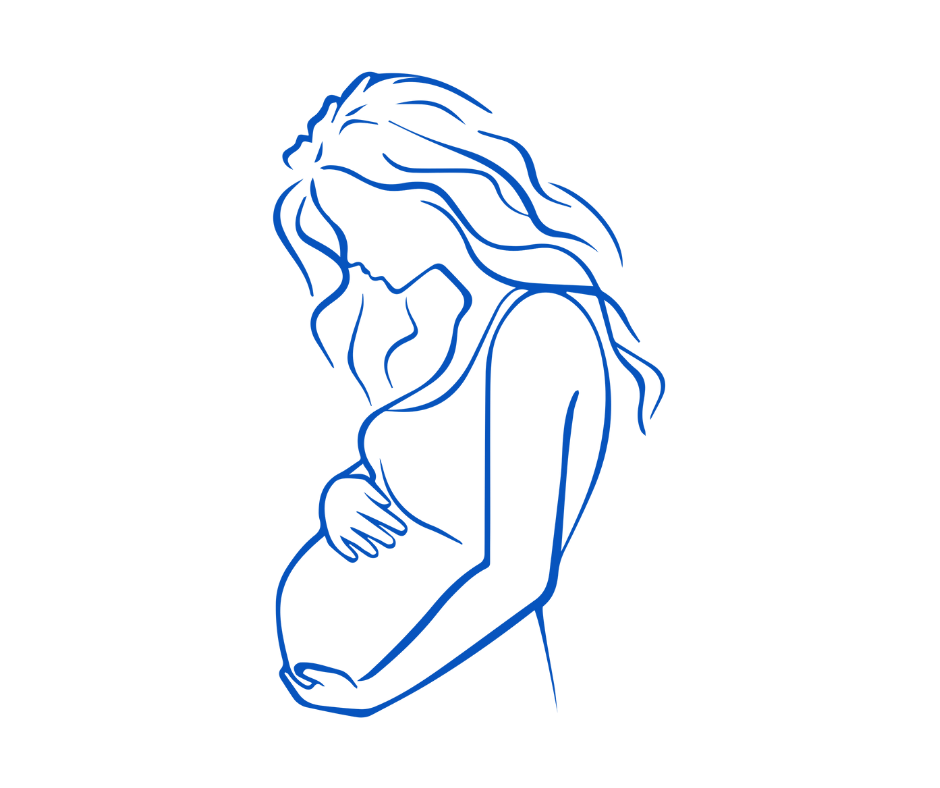 Wellbeing is a term commonly used to describe how we feel emotionally, physically and socially in line with what is important to us. Wellbeing may also be termed as ‘feeling like yourself’. This will look different for everyone, what one person may see as a state of feeling well, another may view completely differently.
Wellbeing is a term commonly used to describe how we feel emotionally, physically and socially in line with what is important to us. Wellbeing may also be termed as ‘feeling like yourself’. This will look different for everyone, what one person may see as a state of feeling well, another may view completely differently.
The perinatal period (pregnancy and the first two of years after your baby is born) is often talked about as the happiest time in your life. This can cause pressure, leading to you feeling that you should or ought to feel happy. But it doesn’t always feel that way.
Pregnancy, and becoming a parent are times of change, and they can have an effect on your wellbeing. It is common to experience an array of emotions during these times, and some highs and lows are to be expected. For example, you may be feeling positive about your pregnancy and baby, with emotions such as elation, love, relief, and surprise. However, you may have some worries and uncomfortable feelings such as anger, frustration, disappointment, and guilt. At times, you will feel a mixture of both highs and lows, sometimes at the same time! Adjusting to conflicting or unexpected emotions can be overwhelming, exhausting, and confusing. Sometimes everything might feel out of control, and you won’t feel like yourself anymore, which can lead to a lack in confidence and feeling alone. Those around you might also notice a change in your behaviour.
Having a child can exceed your expectations or be disappointing and not live up to what you had imagined, both of which are okay. You may have thought that you would feel happy throughout your pregnancy or feel more pleased than you are. We can’t always control our feelings, they are our body’s way of communicating to us what we need. Sometimes we just need some help to figure out what that is! All these feelings and experiences are common, and there are things you can do to look after your wellbeing whilst you’re in the perinatal period, some of which will be outlined in this booklet.
Why does being a parent affect my wellbeing so much?
To look after yourselves during this time, it is important to be aware of why the perinatal period can affect your wellbeing. Being mindful of potential internal and external stressors may help you identify the cause of your distress, enabling you to take back some control of your own wellbeing.
Sources of internal stress can include hormones, sleep deprivation and how you feel about yourself during the perinatal period. Hormones can affect your emotions by swinging from one extreme to another, by being overwhelmed by their intensity, or by going from 0-100. Pregnancy also changes the way your body looks, which can affect how you feel. Some women and birthing people love their pregnant form and feel strong and upbeat. Others don’t enjoy pregnancy, or they dislike the way it makes them look and feel. You may also be feeling sick, suffer from prolonged sickness or have problems sleeping, which can impact your mood.
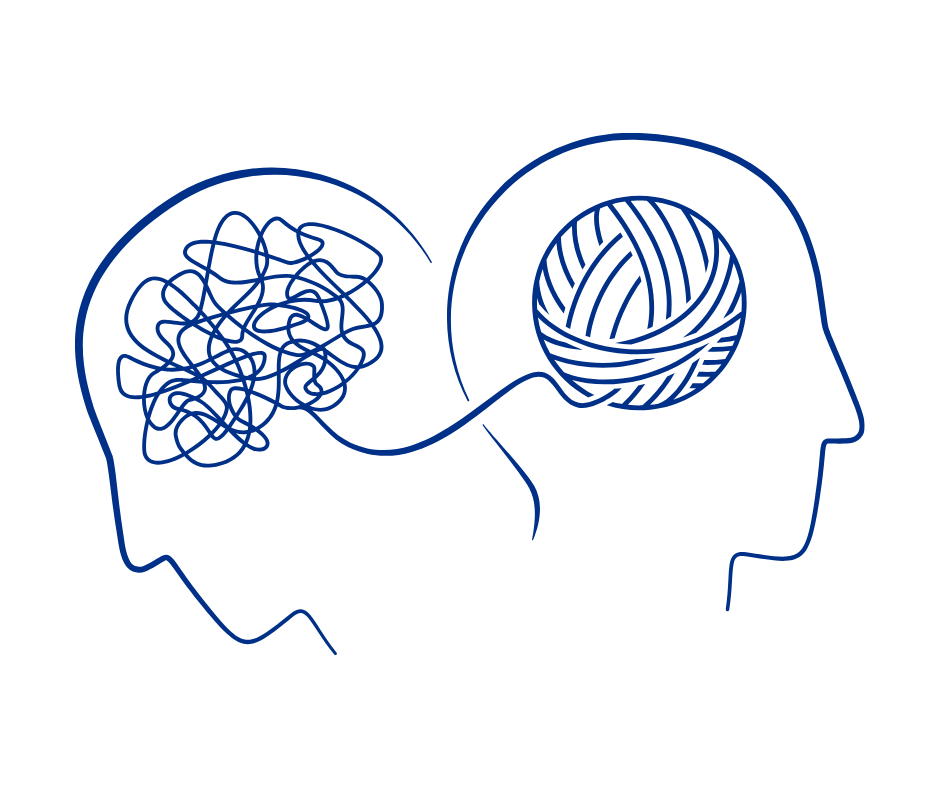
Other experiences can also affect your wellbeing in the perinatal period. For example, having a multiples pregnancy, or worrying about pregnancy complications which is even more likely to be the case if you have struggled with infertility, and/or experienced trauma and baby loss.
There may be other external stressors that contribute to your perinatal wellbeing, such as work, housing, or money problems. Having a baby can also change the relationship that you have with yourself and those around you. Sometimes it can put pressure on your relationship with your partner, close friend or family member, or some people will experience a lack of support from others. These changes in your interpersonal roles with those closest to you, can take time to adjust to, and it can be helpful to allow yourself time to grieve the loss of your old roles, to have room to welcome in the new ones.
For some people before the perinatal period, turbulent emotions may have been a familiar experience, and previously used ways of coping such as using substances may no longer be advisable, contributing to a decline in current perinatal wellbeing. For others, this may be a completely new experience, with unfamiliar emotions and intensity.
Having a child affects you physically, mentally, and emotionally, so it’s no wonder we all struggle sometimes. We would like you all to know that you are not alone in your experience, each new challenge will pass, and needing support is okay.
Sometimes, the fear of the unknown can make us feel anxious or stressed. Getting information you can trust, and some support, can help you feel better prepared. Hopefully this booklet can help you feel more in control of your situations and emotions during this time, please consider using it to help you look after yourself and access more support and information.
Myth busting
|
“It’s a happy time and it’s not normal to be depressed.” |
Having a baby can be stressful or distressing, especially if you or your partner have had complications before. It’s normal to feel a mix of emotions. |
|
“It’s just the baby blues, I’ll be fine.” |
If you are feeling sad for longer than two weeks it is likely not baby blues, and you may need some support to feel better. |
|
“If I tell anyone about my mental health problems, they will think I’m a failure, a bad parent, or that I don’t love my baby.” |
Telling someone about your mental health problems means that they are able to support you when you need it. Everyone needs support sometimes and, for professionals, it shows us that you want to help yourself and your baby. |
|
“Mental health problems only affect certain people.” |
Anyone can be affected by mental health problems- they do not discriminate. |
|
“I will be forced to take medication.” |
Medication is not for everyone, and everyone has the right to choose what is best for them, whether that be having medication, going to therapy, or accepting support elsewhere. |
|
“There’s nothing I can do to help a parent suffering with mental health issues.” |
It can be hard to know what to do for someone who is distressed, and that’s okay. Usually asking the person what they need support with can be a good way to start. Otherwise, we have some information in this booklet that might help you think of some ideas. |
|
“Only mums suffer from mental health issues in the perinatal period.” |
Anyone can suffer from mental health problems in the perinatal period, including partners and dads. |
|
“I’m the only one who feels this way.” |
You are not alone. As many as 1 in 3 people suffer with a mental health problem during the perinatal period. |
|
“Suffering with mental health issues means that I am unable to care for my baby or that my baby will be taken away from me.” |
Professionals want what is best for you and your baby, and usually seeking help is a sign that you are trying to do just this. We want to support you with emotional difficulties so that you can better care for your baby. |
|
“I am never going to feel better.” |
Sometimes having a mental health problem can feel hopeless, but there are others out there who can support you. |
Bonding with your baby
How can I bond with my/my partners bump?
 The relationships parents and families have with their babies are really important. Babies need a safe, loving, and peaceful place to grow. Their brain development is shaped and affected by how their needs are met, and how they are cared for, both before and after arrival. The way your baby builds these close relationships is called attachment. When parents give their baby lots of attention and loving, responsive care, it helps them to feel safe and secure. When a baby feels safe and secure, they learn to manage their feelings and develop healthy relationships in the future.
The relationships parents and families have with their babies are really important. Babies need a safe, loving, and peaceful place to grow. Their brain development is shaped and affected by how their needs are met, and how they are cared for, both before and after arrival. The way your baby builds these close relationships is called attachment. When parents give their baby lots of attention and loving, responsive care, it helps them to feel safe and secure. When a baby feels safe and secure, they learn to manage their feelings and develop healthy relationships in the future.
Bonding describes the feelings of attachment and love from you to your baby. This bond as well as becoming a parent can be incredibly rewarding and enjoyable. For some, this connection can develop very early in pregnancy, for others it is not an instant process but a journey that can be nurtured and grown gradually with time and care. These variations are entirely natural and normal. Partners, in particular, may find that the process of bonding takes time and can be more challenging. Parental bonds develop through caring, communicating and playing with their baby after they arrive. However, when partners are actively involved and supportive during their partner’s pregnancy, they are more likely to develop a strong bond with their baby and this can also have a positive impact on their relationship with the birthing parent.
Ways of bonding with your unborn baby:
- Singing, talking, and reading to your bump.
- Keeping a pregnancy diary including noting your baby’s milestones such as their first movement.
- Touching and massaging the growing bump.
- Writing a letter to your baby with your hopes and dreams for them.
- Looking at scan images.
- Preparing for baby’s arrival.
How can I bond my new-born baby?
We are all born to relate to one another, and babies are born ready to meet their parents. Right from birth, your baby will be able to recognise your voices and they will enjoy fleetingly looking at your faces. After a few weeks, they will gaze for longer. However, parents and babies can’t be connected all the time, that would be overwhelming for babies and exhausting for you, so babies will connect for a short time then they need to look away. Allow your baby time to engage again when they are ready. Being connected is not all about face-to-face interactions- touch and movement are also important.
Cuddling your baby next to your skin allows them to smell you and hear your heartbeat, which will comfort and calm them as well as you, and can be particularly useful when your baby cries! Keeping your baby close to you allows you to start to recognise the signals they make, like when they are hungry or want a cuddle. Responding to these signals will make your baby feel safe and will also support feeding.
New babies have a naturally strong need to be close to their parents as this helps them to feel secure and loved. When babies feel secure, they release a hormone called oxytocin. Activities such as smiling at, holding, or talking to your baby can release this hormone in both parent and baby. For an infant, this acts like a fertiliser for their growing brain, helping them to be happy babies and more confident children and adults.
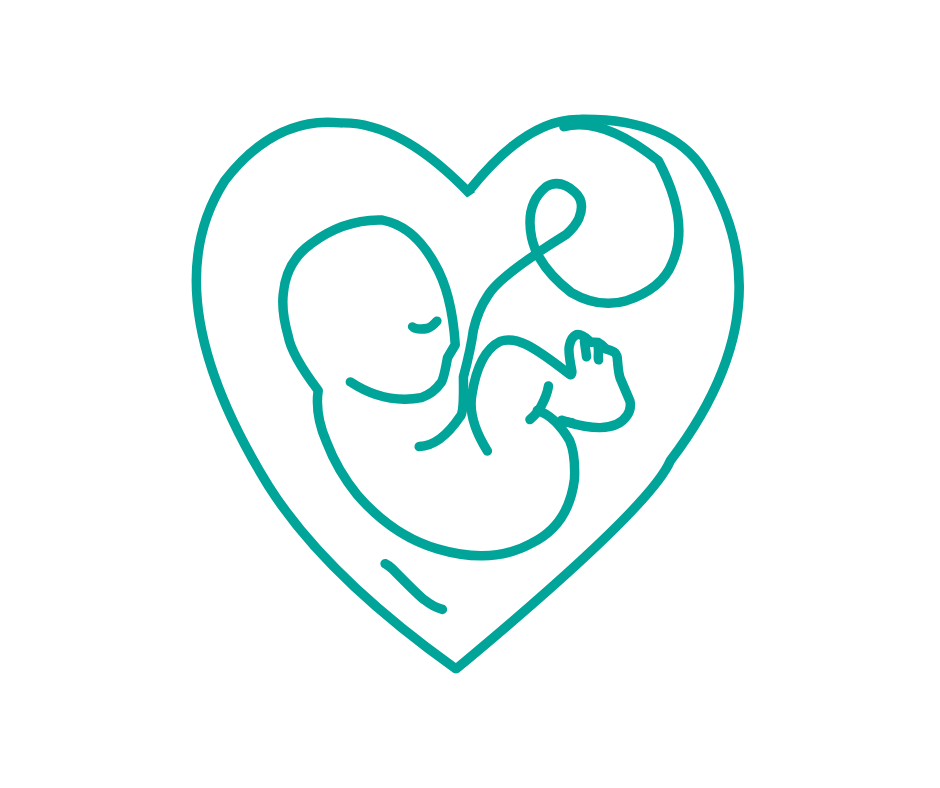
Ways of bonding with your baby after birth:
- Touching- holding your baby close, cuddling, skin-to-skin contact.
- Carrying out everyday needs- changing nappies, feeding, winding, and bathing. Sharing eye contact and talking to your baby at these times.
- Talking, smiling, and singing softly- your baby may find it comforting to listen to you and see you close by. Leaning in close to your baby and smiling, then giving your baby time to respond by leaving space for them and looking for their response. Remember babies love faces and their parents are their favourite toys!
- Watching and wondering- allow yourself time to get to know your baby, their different feelings, and their signals.
- Reading to your baby- tell your baby stories, share a book. Your baby will enjoy hearing your voice and being in your arms.
- Diary writing or journaling - another way to capture memories and experiences you have shared and enjoyed with your baby, which you could look at together when they are older.
Medication
What supplements should I take in pregnancy?
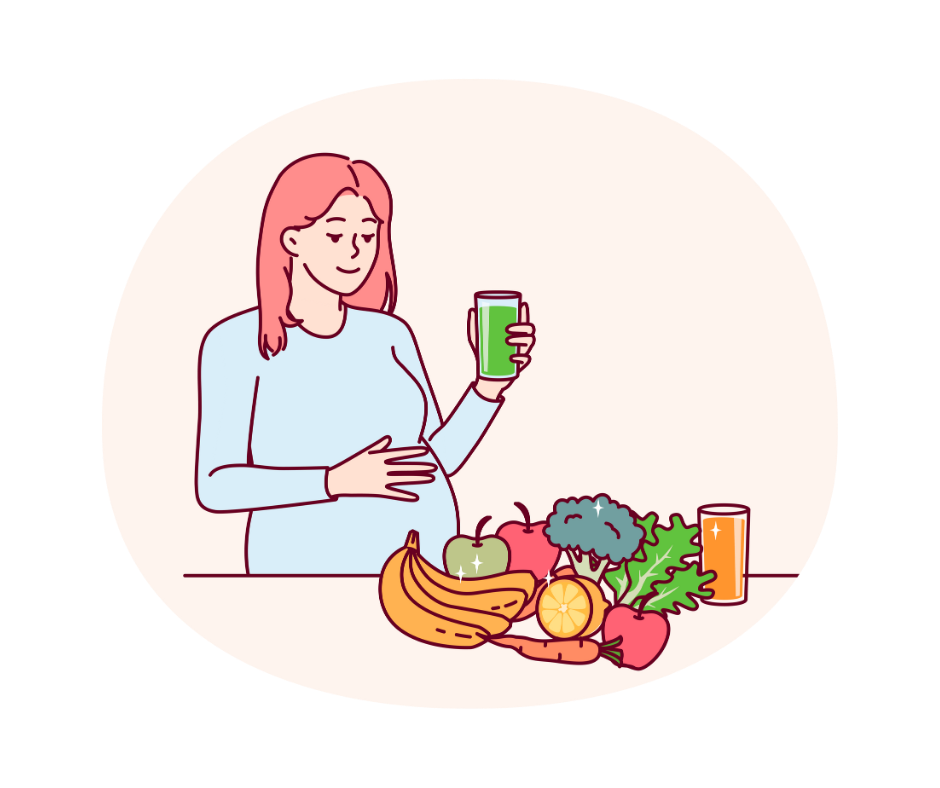 Eating a healthy, varied diet in pregnancy will help you get most of the vitamins and minerals you need.
Eating a healthy, varied diet in pregnancy will help you get most of the vitamins and minerals you need.
When you're pregnant, or there's a chance you might get pregnant, it's important to take a folic acid supplement and to consider the need for a Vitamin D supplement.
Folic acid supplements should be taken when you are trying to become pregnant and for the first 12 weeks of a pregnancy. Most people can take low dose (400 microgram daily) folic acid which can be purchased. If you are at higher risk of folate deficiency during pregnancy, you may be prescribed high dose folic acid (5mg daily).
It's recommended pregnant and breastfeeding women take a daily supplement containing 10 micrograms of vitamin D between September and March.
You can find out more about folic acid and vitamin D supplement on the NHS website.
What if I take prescribed medications when I'm pregnant and/or breastfeeding?
 Many people worry about the effects of medication on the unborn and new-born baby. It’s important to remember the emphasis is on your health being as stable as possible to give your baby the best outcomes.
Many people worry about the effects of medication on the unborn and new-born baby. It’s important to remember the emphasis is on your health being as stable as possible to give your baby the best outcomes.
Many medicines cross the placenta and also transfer into breastmilk. There is a balance between the benefits of medication to your pregnancy and the possible risks. This balance of risks and benefits can be unique for each person and even for each pregnancy. It is important you are supported by your healthcare professional to explore the risks and benefits for your current or future pregnancy. This could be your GP, practice nurse or pharmacist, or a specialist clinician.
For people experiencing moderate to severe mental health illness, or for people at high risk of experiencing a decline in mental health particularly after the arrival of your baby, staying on medication that keeps you well may be better than stopping medication and becoming unwell.
If a decision is made to stop medication before or during a pregnancy, it may be advised to do this gradually to reduce the chance of any discontinuation or withdrawal effects.
Information about taking medication during pregnancy can be found on the BUMPs (Best Use of Medicines in Pregnancy) website.. Your specialist mental health team may also have access to the Choice & Medication website which contains information specifically about mental health and mental health medication during pregnancy and breastfeeding.
Please visit the NHS website on medicines for more information.
Please visit Tommys for more information.
Labour and birth
How can I prepare myself/my partner for birth?
Many people wish to prepare for labour, birth and the first days of parenting by attending antenatal classes or creating a birth plan. Your midwife will be able to advise you on when antenatal classes are running locally. Face to face antenatal classes offer the additional benefit of meeting other expectant parents in your local area. There are lots of providers who offer antenatal classes online, often for a fee. You might want to research these or follow a personal recommendation if you use these services.
Antenatal education classes will cover a variety of topics that often include:
- Signs of labour
- What to expect during birth
- Types of pain relief
- Feeding your baby
- Early parenting skills
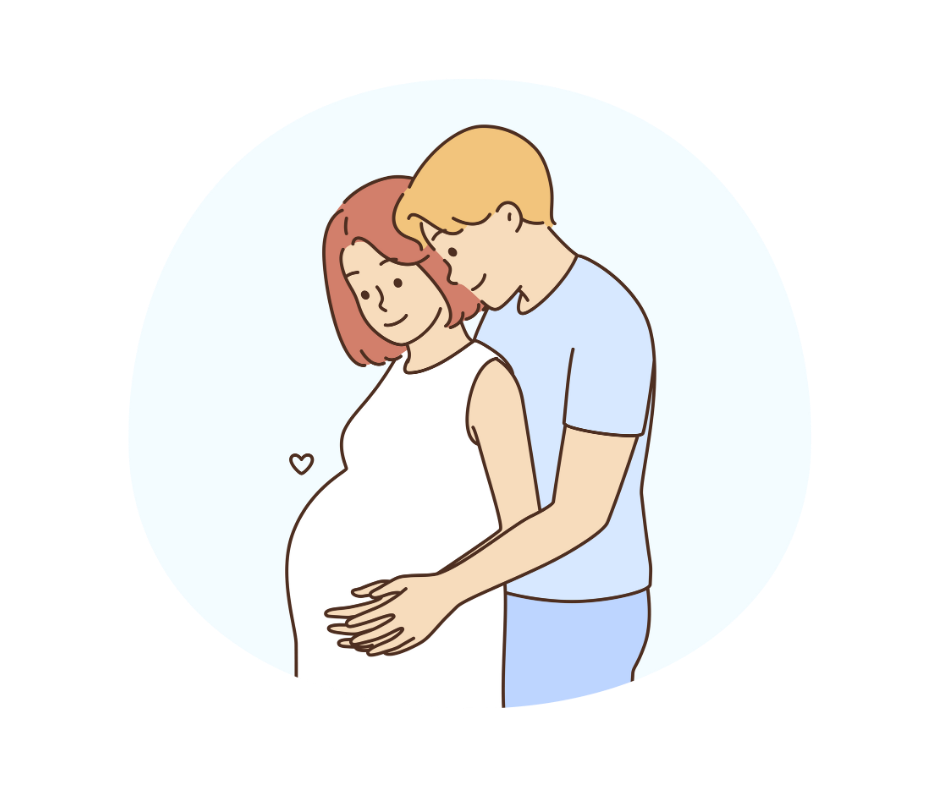 Preparing yourself for labour and birth by accessing good quality, reliable information, might help to ease any nerves that you might feel. Some people also prepare a birth plan, or birth preferences, to document what they have considered and therefore do or don’t anticipate they will want during labour and birth. Birth plans can include both the physical and the emotional aspects of labour and birth. Documenting your plan and preferences in this way can help you to feel more in control and can assist you in advocating for yourself and your preferences. Your midwife will often ask you about a birth plan and can help you to create one by discussing your birth preferences with you in the later antenatal period. If you have any additional physical or mental health needs in your pregnancy, you may also be supported by midwives to create a Personalised Care and Support Plan (PCSP).
Preparing yourself for labour and birth by accessing good quality, reliable information, might help to ease any nerves that you might feel. Some people also prepare a birth plan, or birth preferences, to document what they have considered and therefore do or don’t anticipate they will want during labour and birth. Birth plans can include both the physical and the emotional aspects of labour and birth. Documenting your plan and preferences in this way can help you to feel more in control and can assist you in advocating for yourself and your preferences. Your midwife will often ask you about a birth plan and can help you to create one by discussing your birth preferences with you in the later antenatal period. If you have any additional physical or mental health needs in your pregnancy, you may also be supported by midwives to create a Personalised Care and Support Plan (PCSP).
How can I recover after birth?
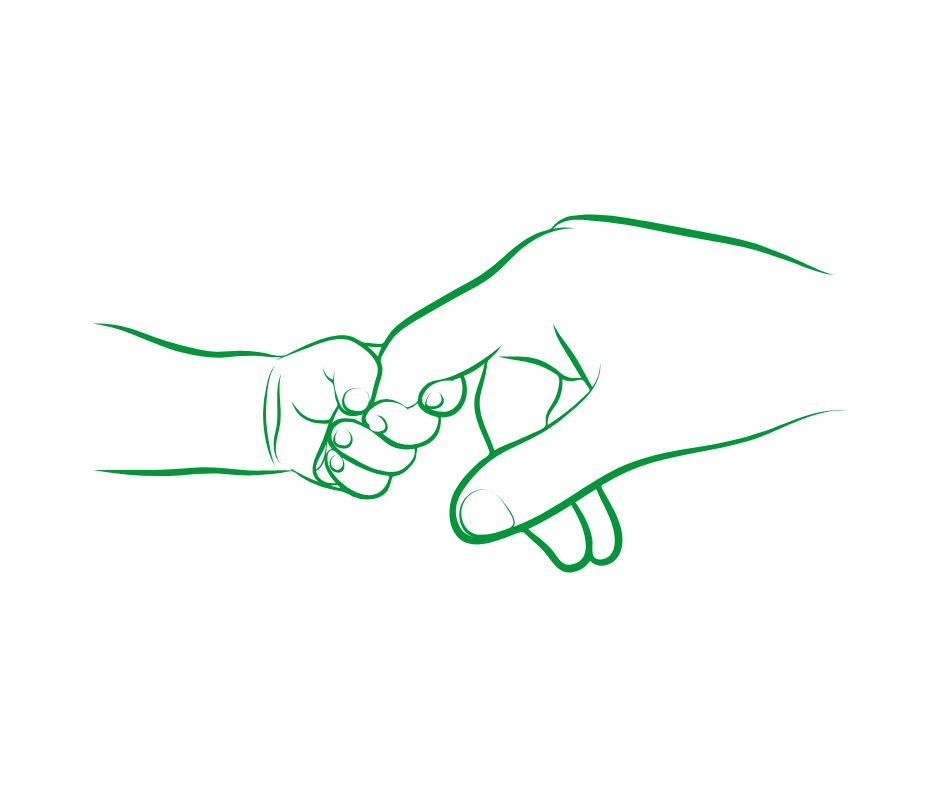
Your body has just been through a challenging experience, and you’ll probably feel sore and bruised. After you give birth, your body will take its time getting used to not being pregnant anymore. If you’ve had a caesarean section, you may experience many of the same things as with a vaginal delivery. You’ve also had major surgery and need to look after yourself. Try not to do too much, so your body can heal. Find out more at recovering at home after a c-section.
There are some common experiences for most birthing people after giving birth including:
- Pain and cramping- general aches and pains as your body changes after birth, including your womb contracting to its normal size. Some pain can intensify when you are breast/chest feeding. If you had pelvic pain in pregnancy, this may take a few weeks to get better after you’ve had your baby.
- Bleeding- you’ll bleed from your vagina after giving birth vaginally or by c-section, and it’s usually heavy at first. General advice is to wear maternity pads or pants for the first 6 weeks after birth.
- Stitches- you may have had stitches after tearing or an episiotomy (where the doctor or midwife makes a cut to make the opening of the vagina a bit wider) during the birth. Find out more about recovering from a perineal tear.
- Difficulties going to the toilet- you may find it difficult to wee or poo after giving birth, especially if it has been a more complicated birth, and/or you have had an epidural. It is common for it to sting or be sore when you wee at first and also to not be able to poo for a few days after birth, so it’s important to try to not get constipated or to strain.
- Incontinence- some people may leak urine after having a baby. This is more likely if you had a vaginal birth, but some women who had a c-section may also experience this. You're more likely to have incontinence if you also had problems with controlling your bladder in pregnancy, if you had a long labour, or an assisted birth. Doing your pelvic floor exercises can help with this. Some women may also have problems controlling their bowels. This is more likely to happen after a third- or fourth-degree tear. Most women who have a third, or fourth-degree tear heal completely and have no lasting complications.
Don't be embarrassed to talk to your midwife, health visitor or GP if you are concerned about any of the above problems.
Adjustment
How can I manage all these changes?
Becoming a parent is a big life change, so it’s a given that it’ll take some time to get used to. Adjusting to life as a parent requires adapting to new routines, managing sleep deprivation, and finding a balance between caring for your new baby and taking care of yourself.
Coping with different routines and what is often a very steep learning curve can take a lot of energy. And sometimes, that is energy you simply don’t feel you have.
Your new-born baby may or may not be the baby that you expected or imagined. For example, some babies will be very settled, while others will take time and may cry a lot – demanding great patience and commitment. This is particularly the case if your baby has health or medical problems like colic or reflux that can cause them to be more unsettled.
You may have moments in early parenthood when things feel out of control. It’s normal, too – particularly for first time parents – to experience fleeting doubts as you find yourself constantly learning and adapting in these first weeks.
Managing everything that's on your plate when you have a new baby can be overwhelming.
Here are some other strategies that may help with adjusting to parenthood:
- Asking for help when visitors come over, even if it’s just getting them to pop on a load of washing.
- Setting aside 15 minutes at the end of the day to pick-up toys/clutter. It will make you feel better in the morning!
- Breaking things down into smaller tasks. Don’t try to tackle everything at once. Instead, try to break things down, like tidying just one area at a time.
- Being mindful of what you see on social media. Social media doesn’t always reflect real life. It’s easy to remove clutter from the frame, to choose a place that’s tidy to snap a photo and to present the image that everything’s under control. But remember, most mums are struggling to keep things clean and tidy. Just like you.
- Try to be kind to yourself. A messy house doesn’t mean you’re a bad parent, or that you’re failing at parenthood. You are likely to be directing your attention to where it matters most – the needs of your new-born baby.

What changes will happen to my/my partners body?
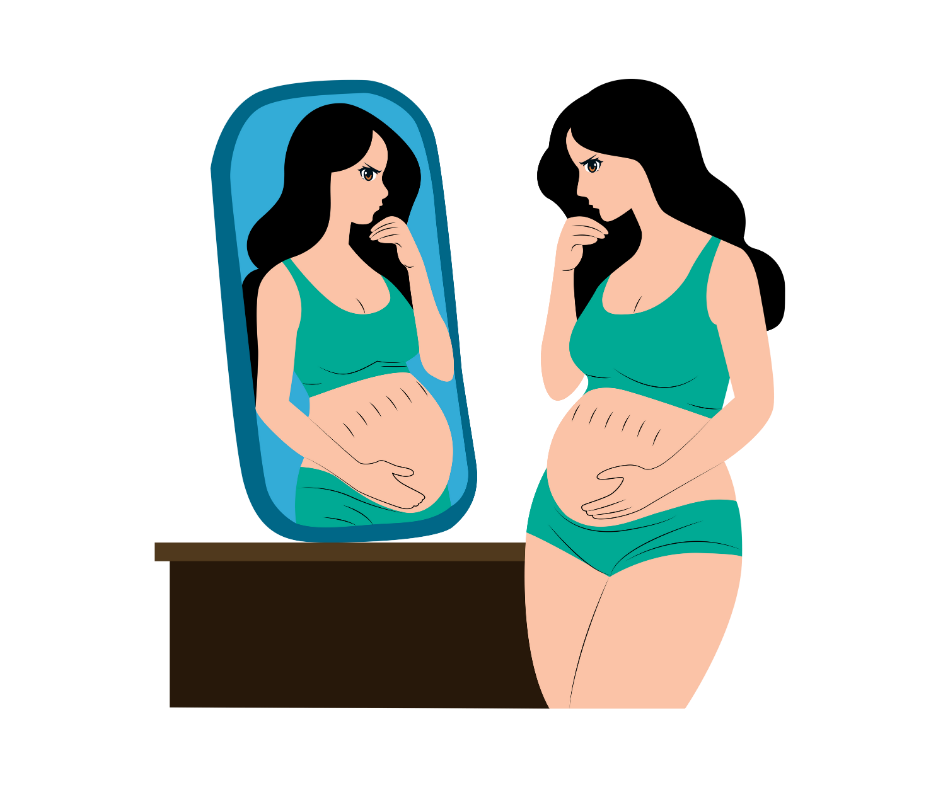 Body image is a person’s opinion, view, mental image, perception and attitude (emotional beliefs, feelings, and appearance) towards their own physical body.
Body image is a person’s opinion, view, mental image, perception and attitude (emotional beliefs, feelings, and appearance) towards their own physical body.
It is one thing to know that your body will change during pregnancy, it’s another thing to experience it. There are societal pressures to look a certain way – during and after pregnancy but our bodies can take some time to adjust and recover. This is likely to require some level of self-acceptance as there may be short-, medium- or long-term changes in the way your body looks and feels.
Common physical changes in pregnancy might include weight gain, changes in body composition and altered mobility. You may also experience certain physical changes soon after delivery, including lochia (vaginal bleeding), breast engorgement, discomfort in the perineal area, constipation, and after pains. All these physical changes are normal and usually short term. However, if you have any concerns about these changes, you could discuss them with your healthcare professional. There is a great variation in how our bodies physically adjust during and after pregnancy and these changes can happen over weeks, months and even years. For example, it takes two years for your electrolyte levels to return to “normal.” Changes in our bodies and body image can impact greatly on our energy levels and self-esteem.
Your priority in the early days and weeks is to look after yourself – and not put too much pressure or expectations on yourself and how you may look.
Please remember that while your body may not feel like yours right now, in time it will!
For more information on bodily changes in the perinatal period please see the below websites:
Physical changes in pregnancy - Pregnancy week-by-week - NHS (www.nhs.uk)
Body image after having a baby - Pregnancy Birth and Baby (pregnancybirthbaby.org.au)
Body image - Mental Health Foundation.
Your post-pregnancy body - NHS (www.nhs.uk)
What if my relationships with others change?
 As with any life change, the way you feel about yourself and those around you might change during the perinatal period. The relationships with ourselves, our partners, other caregivers, or those closest to us usually go through a transitional phase, mirroring what is happening in our lives. Similarly, the roles we are usually in change. For example, as well as being in the role of a romantic partner, you will also be in the role of a parent, which can sometimes create feelings of grief for losing the “old you” and the “old us”, or, act as an anchor to bring you closer, navigating your newfound roles together.
As with any life change, the way you feel about yourself and those around you might change during the perinatal period. The relationships with ourselves, our partners, other caregivers, or those closest to us usually go through a transitional phase, mirroring what is happening in our lives. Similarly, the roles we are usually in change. For example, as well as being in the role of a romantic partner, you will also be in the role of a parent, which can sometimes create feelings of grief for losing the “old you” and the “old us”, or, act as an anchor to bring you closer, navigating your newfound roles together.
It's common for couples to have arguments every now and then when becoming parents. It's important to realise that during pregnancy and postpartum there are understandable reasons for some difficulties, as well as reasons for feeling closer and more loving. But there are some common reasons why you may argue more when you’re pregnant or have just had a baby:
- You may feel your partner is less interested in the pregnancy than you are.
- The baby doesn’t seem real to you or your partner.
- You feel your partner is being too protective of you.
- You are both stressed about money.
- One of you wants to have sex but the other one doesn’t.
- You are feeling sick, tired, and moody.
- You are both anxious about being parents.
- You are worried your partner won’t find your changing body attractive.
Communication can help nurture your relationship during pregnancy and postnatally. Here are some tips:
- Talk to each other about how you feel about being pregnant and what's to come — the positives and negatives. Try to talk in a way that explains your views rather than blames your partner.
- Talk about your hopes and dreams for your family and what rituals and traditions are important. Shared values about child raising are really helpful!
- Talk about your individual parenting styles. If your styles turn out to be different, you might need to work on solving problems together with negotiation and compromise.
- Be open and honest about your sexual needs.
There are also practical ways you can help to manage the impact of pregnancy on your relationship:
- Go to antenatal classes together.
- Consider getting some help with managing your money if you're worried about the cost of having a baby.
- Talk about how you'll make time for yourself and time for your partner.
- Discuss how you'll share household tasks now and after the baby is born.
Some couples split up when they are expecting or have had a baby, or it may be that you don't have a partner. These circumstances can be tough, and you may need extra support from family and friends, or services. The charity Gingerbread supports single parents by providing information about things like financial support, housing, money and you and your child’s wellbeing. You don’t have to go to antenatal visits by yourself and cope with labour on your own. You have the right to take whoever you like: a friend, or a family member. If you do not have a partner, you can also ask your midwife if there are antenatal classes in your area that are run especially for singles.
When you are having a baby, there may be other people around you who are excited, including your family and friends. People can offer help in all sorts of ways, and you'll probably be happy to have their support. Sometimes, you may need to put limits on outside help, for example, if it feels as if they are taking over.
Being a parent may also put you on the receiving end of a lot of advice and perhaps criticism. There will be times when you appreciate the advice but also times when the advice is not wanted or helpful. The important thing is to decide what is right for you. After all, it is your baby. If unwanted advice is becoming a problem, explain gently that there are some decisions that only you can make, and some things that you prefer to do on your own.
Domestic abuse
Although for some there are understandable reasons for difficulties and arguments, for others, having a baby can be a trigger for domestic abuse, or existing abuse may get worse during this time. Domestic abuse during pregnancy can put you and your unborn child at risk of harm, either physically and/or emotionally, which can affect the development of your baby. There are lots of different types of abuse, and no set of circumstances are the same, so it may be hard to recognise or admit what is going on. Remember that domestic violence or abuse can happen to anyone, no matter their background or gender, and you are not alone. There are professionals you can talk to if you are having a family, and you are being abused.
For more information and support with relationships and domestic abuse please see the below websites:
24-hour freephone National Domestic Abuse Helpline, run by Refuge – call 0808 2000 247 for free confidential advice.
Refuge – find out more about the services available for women and children.
Women's Aid – find your local service for help in your area.
Galop – if you are LGBT+.
Looking after baby
How can I keep my baby safe in pregnancy?
 When it comes to taking care of yourself and your baby, it’s important to listen to your instincts.
When it comes to taking care of yourself and your baby, it’s important to listen to your instincts.
If you feel something isn’t right, always contact your midwife, GP or local maternity unit for support.
This is particularly important when it comes to your baby's movements. There is no set number of normal movements you should be feeling – every baby is different. However, contact your midwife or maternity unit straight away if you think your baby’s movements have slowed down, stopped or changed.
In the third trimester, advice is to go to sleep on your side as this has been shown to be the safest thing for you and your baby.
What about if I use substances?
When you are pregnant, taking drugs, including tobacco and alcohol, even in small quantities, can put you and your baby’s health at serious risk.
Being pregnant or planning a pregnancy can be a time to make positive changes to your life and that of your baby’s.
There is support available; talk to your GP, midwife, Health Visitor or pharmacist. You will not be judged and can be supported to access a wide range of other services to help you have a safe and healthy pregnancy.
Smoking and your unborn baby
When you smoke, carbon monoxide and other harmful toxins travel from your lungs into your bloodstream, through your placenta and into your baby's body. When this happens, your baby struggles for oxygen which affects their health and development. Protecting your baby from tobacco smoke and exposure to e- cigarettes during pregnancy is one of the best things that you can do to give your child a healthy start in life.
When you stop smoking:
- you are more likely to have a healthier pregnancy and baby.
- you reduce the risk of stillbirth.
- you reduce the risk of baby being born prematurely.
- you reduce the risk of sudden infant death syndrome (SIDS).
Stopping smoking will help both you and your baby immediately. It is never too late to quit.
You are twice as likely to be successful at quitting with support.
If you can make it to 28 days smoke-free, you are 5 times more likely to quit for good!
Smoking cessation support and further information:
- Better Health: Start for Life.
- NHS Quit Smoking app - daily support to help you quit smoking and start breathing easier
- National Smokefree helpline on 0300 123 1044 from 9am to 8pm Monday to Friday, and 11am to 4pm Saturday and Sunday
Drinking alcohol while pregnant
Alcohol passes from your blood through the placenta to your baby. Your baby’s liver cannot process alcohol and this can be extremely harmful to their development. Drinking alcohol, especially in the first 3 months of pregnancy, increases the risk of miscarriage, premature birth and low birth weight. It can also affect your baby after they are born.
It is recommended that you should not drink alcohol if you are pregnant or planning to become pregnant. This will keep any risk to your baby to a minimum.
Alcohol in pregnancy further information and support:
- NHS Better Health website.
- Tips for avoiding alcohol in pregnancy on the Tommy's website
- Turning Point website.
- Drinkaware. They run a national alcohol helpline; if you're worried about your own or someone else's drinking, call this free helpline on 0300 123 1110 (weekdays 9am to 8pm, weekends 11am to 4pm)
- Alcoholics Anonymous (AA). A free self-help group; its "12-step" programme involves getting sober with the help of regular support groups.
Illegal drug use in pregnancy
Illegal drug use during pregnancy has a serious effect on you and a serious damaging effect on your unborn baby. It increases the risk of pregnancy complications. Almost all drugs will pass through the placenta to reach your baby – there are no illegal drugs that have been found to be safe in pregnancy, even in small amounts.
Cannabis can trigger mental health issues, even if you have never experienced them before. It can also make any existing mental health issues worse.
If you regularly use cocaine, heroin, or other similar drugs (opiates or opioids), do not stop or reduce the amount you take without seeking support first. This is important to safely withdraw from drugs in the right way, to reduce associated risks for you and your baby.
Getting the right advice and seeking help straight away can really improve the outlook for you and your baby. With the right help and support, it is possible for you to get drug free and stay that way - you are not alone.
Illegal drug use in pregnancy further information and support:
How can I feed my baby?

As a parent you may choose or not have a choice about how your baby is fed. You may breast/chest feed, formula feed exclusively, or combination/ mixed feed your baby. Whichever method you use, it is okay for you and your baby. The priority is that you and your baby are healthy.
As a parent you may have decided not to breastfeed, stop after a short time, not had a choice, or found that breastfeeding did not come naturally and you experienced problems, such as baby latching incorrectly, mastitis, sore and cracked nipples or baby struggling to feed, due to tongue-tie. Try to get support early if you are having problems but want to carry on breastfeeding. Your midwife and health visitor are there to help you find the best way forward.
It is completely natural to have conflicting feelings. Some parents may feel guilty or sad about combination feeding their baby, especially if they had planned to breastfeed exclusively. Do not be hard on yourself. Every parent and baby is different; there are many reasons why combination or formula only feeding may be the best thing for both of you. There is no need to feel guilty. It is your right to decide how to feed your baby.
For more information and support on infant feeding please see the below websites:
Infant milks for parents & carers — First Steps Nutrition Trust
Weaning - Start for Life - NHS (www.nhs.uk)
Feeding Your Newborn Baby: How Much & How Often? | Tommy's (tommys.org)
Formula Feeding Guide & FAQs | Tommy's (tommys.org)
Breastfeeding Information & Support | Tommy's (tommys.org)
Expressing & Storing Breast Milk | Tommy's (tommys.org)
Feeding your premature baby in hospital | Tommy's (tommys.org)
What if my baby has a condition?
If you continue with your pregnancy after screening has found that your baby may have a medical condition, you might need extra care and support.
The care you and your baby needs depends on the condition they have. Speak to a doctor or midwife to get as much information as possible about your baby's condition, as well as possible care and support both you and your baby might need.
You can bring your partner, a family member or friend with you to your appointments. It might help to write down any questions you have before you go. You could ask things like:
- Will we need extra support during the birth?
- Will my baby need treatment straight after birth?
- Where will this treatment take place?
- Will my baby need to stay in hospital?
- If they do, how long will that be for?
- How will my baby develop?
Having a baby with a condition can bring up lots of emotions, so please don’t suffer in silence. Support is available and it can help to speak to: your partner, family or friends, your midwife or specialist doctor, a local support group, charities for your baby's condition or a counsellor/therapist/mental health team, during pregnancy and beyond.
For more information and support if you have or might have a baby with a condition please see the following websites:
- The charity Bliss has a range of emotional and practical support. This includes an email support service, support via video call and local volunteer access. Visit the Bliss website to find out more. You can also get peer support through the Bliss and Netmums forum which is a supportive online community for parents, families or carers of babies born premature or sick.
- The charity Contact provides support to all families with disabled children. It puts families in touch with one another for mutual support. It can also refer you to other charities that specialise in your child’s specific disability or health condition.
- Cerebra offer an information and support service for parents, carers and others involved with any child with a brain-related condition.
- The Cystic Fibrosis Trust has a helpline plus information and support on any aspect of cystic fibrosis.
- Down's Syndrome Association can give advice and guidance about Down’s Syndrome.
- Genetic Alliance UK is a national charity supporting people who are affected by genetic disorders.
- Mencap is a charity that provides information and support to families of children with learning disabilities.
- Newlife is a charity for children with disabilities. Their services include a free helpline, equipment grants and emergency equipment loans.
- NHS provides information on caring for a child with disabilities.
- Peeps is a charity that supports families those who have had an H.I.E. event (Hypoxic-Ischaemic Encephalopathy).
- Scope is the disability equality charity in England and Wales providing practical information and emotional support.
- Shine provides specialist support for anyone living with spina bifida and/or hydrocephalus, and to parents and carers.
- The Sickle Cell Society provides information, counselling and care for people with sickle cell disorders and their families.
- SOFT is the support organisation for trisomy 13 or 18 and related disorders.
Looking after you
How can I look after myself?
Pregnancy and parenthood involve lots of changes, some of which can be stressful and feel tricky to navigate. It is important that you are kind to and look after yourself during this time. Self-care can sometimes feel difficult when you are pregnant or have had a baby, as we often focus on baby and forget about ourselves and our own needs. However, prioritising ourselves helps us to manage both our mental and physical wellbeing, as well as the wellbeing of our babies and those around us.
There are many different ways in which we can look after ourselves. For example, rest, gentle exercise, eating a healthy diet and taking time to relax. These things can sometimes feel like they aren’t easy to do with a baby, and you may feel like you have no time to yourself or feel that you spend a lot of time at home. It is important to try and take some time to do something that makes you feel good, even if it’s only for a couple of minutes. Think about what helps you unwind. This could be meditation, phoning a friend, writing a short card/note to someone, listening to music, reading a book, watching tv or crafts. If you feel able allow, yourself to ask for help, from family, friends, and professionals.
Visit Mind for more information on relaxation tips.
Talking to others, including other new parents, about how you are feeling and sharing experiences can be useful and reassuring. It can also be helpful to talk to a peer or professional about how you are feeling. There are many ways to do this through peer groups which also offer email and text services.
Visit Pandas Foundation for more information.
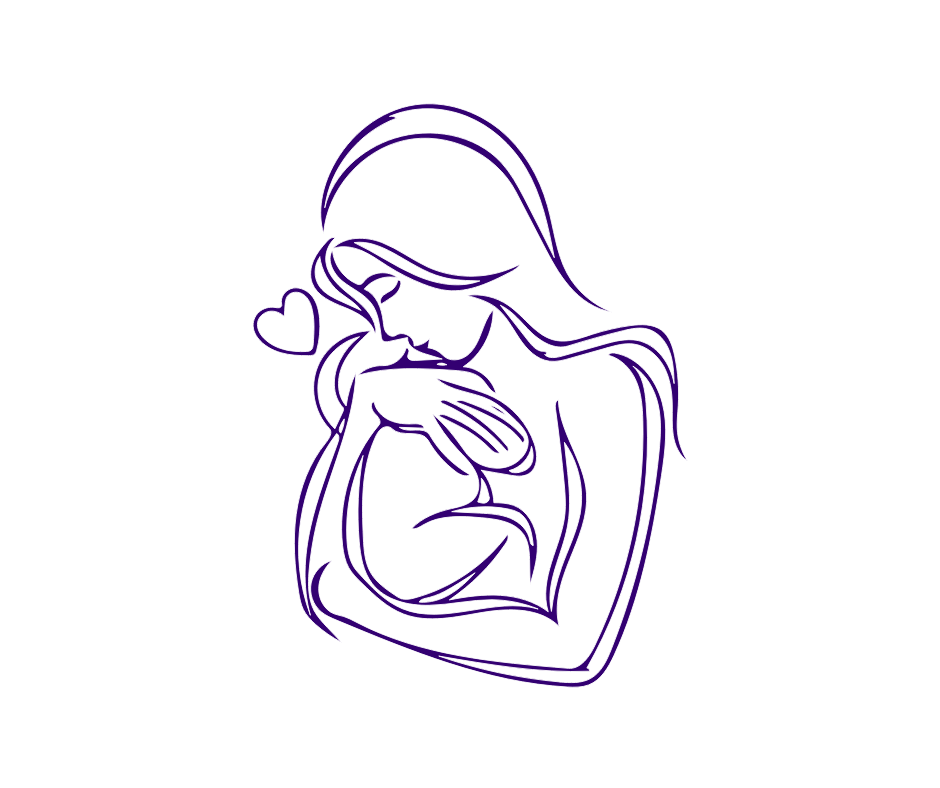
Sleep
“Get some sleep in whilst you still can”. Lots of women find it difficult to sleep during pregnancy for many reasons, including hormonal changes, increased urinary frequency, heartburn and difficulties getting comfortable with bump- to name just a few! It is normal to feel tired during pregnancy as you are growing a human! Trying to prioritise rest and seeking support from those around you when possible is important.
“Sleep while the baby sleeps”. It can be really frustrating to hear others say this to you, particularly if you have a baby who ‘catnaps’ or likes to be held a lot of the time. We all know that it is really important for both our physical and mental well-being to try and get adequate rest and sleep and amongst night feeds, nappy changes and seeing to other responsibilities it can be really difficult. Looking after a baby is a full-time job and getting things done as quickly and efficiently as you would like to can be a massive challenge. Trying to share some of the load, or looking at prioritising what is most important, and what can perhaps wait, is a good way to start. Always remember- looking after a baby is a full-time job!
Keeping well
An adult should aim to do at least 150 minutes of moderate intensity exercise per week, this includes pregnant people and new parents. If you’re not used to doing exercise, it’s important to start steady and stop if you find anything uncomfortable. Vigorous activity is not recommended if you were inactive before pregnancy, and equally if you were active before pregnancy. Instead, listen to your body and maintain physical activity if you feel comfortable. Keeping active in a way which you enjoy can help you to stay motivated and consistent. For example, joining something like an aqua natal or pre/post-natal yoga class can also be a great way to meet other parents.
There is specific advice regarding physical activity which varies according to gestation, existing levels of activity and type of delivery. One You Lincolnshire offers free health and well-being programmes. You can sign up at One You Lincolnshire.
Visit this Mum Moves - Active Lincolnshire for more information.
How can other people support me?
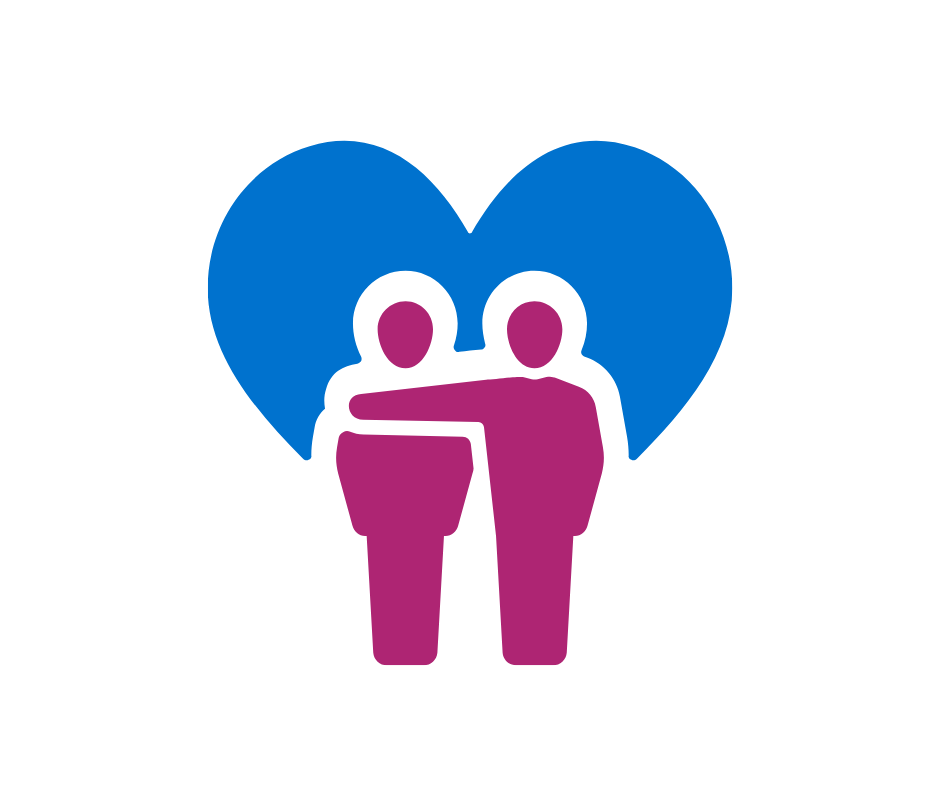 Being a new parent can cause feelings of isolation, so it can be helpful to reach out for support from either your partner, family or friends, who can help you stay connected. Having support around you is important before, during and after a pregnancy. Families and relationships can be complicated though.
Being a new parent can cause feelings of isolation, so it can be helpful to reach out for support from either your partner, family or friends, who can help you stay connected. Having support around you is important before, during and after a pregnancy. Families and relationships can be complicated though.
Often those around us may want to offer support but they may not know what you need or may not want to interfere.
It is good to ask for help instead of waiting for it to come to you.
Here are some suggestions of how others can support you:
- Cooking healthy meals.
- Taking the baby or other children out so you can get some rest.
- Doing household chores, such as cleaning or laundry.
- Spending time entertaining the baby while you take a break – even if it’s just to have a bath or shower.
- Being there for you to talk to and share experiences where appropriate.
- Going for a walk together.
- Supporting you with your appointments.
Building future networks
Pregnancy and afterwards can be a time when people may find it helpful to develop their social network – to build new friendships with people who are at the same stage of life. Talking to other new parents and finding that they may share similar anxieties and frustrations can be reassuring. It can also give you a chance to share skills and experiences, to realise that you are not alone and, above all, to get some emotional and practical support.
If you're looking to meet other new parents face-to-face, your local children’s centres are free to attend and host a variety of groups for different stages. You can also take a look at NCT’s list of local activities and meet-ups in your area. Stay connected with apps like peanut and baby centre which are designed to make it easy to meet, chat and learn from like-minded parents, in your local area, or across the globe!
Asking for help is important. It doesn’t mean you can’t cope or are not able to care for your child.
How can I look after myself as a Trans or non-binary parent?
Pregnancy and after birth can be a very emotional time. Hormones can contribute to a mix of highs and lows and you’re also thinking about how life is about to change. If you are pausing testosterone and becoming pregnant, this can also increase feelings of gender dysphoria during and after pregnancy. This experience will be different for every person, but it’s important to make sure that you feel supported at this time. Try to let your midwife, health visitor or doctor know if you are struggling to manage any difficult emotions.
Your journey to becoming pregnant may be a different experience for you than most so if you are thinking about trying for a baby, you can find information and read others’ experiences on the Trans Fertility website. If you have started hormonal transition and you are trying to get pregnant, or you become pregnant unexpectedly, you will need to speak to your GP about the next steps for your testosterone therapy (T) and will be advised to stop taking it. You’ll also need to arrange your antenatal care when you get pregnant. You can self-refer to some NHS hospitals and your GP can also refer you.
Don’t be afraid to speak to your healthcare providers about how they can support you during pregnancy and after birth. Your team are there to take care of you and your baby, and using inclusive language, that is personal to your individual situation, is crucial in helping you feel recognised and respected. You may wish to write down a list of preferred language terms that you can give to your midwife to keep with your antenatal notes, as you might be cared for by several healthcare professionals throughout your pregnancy and this may prevent you having to repeat your needs during appointments. You can also ask your healthcare professionals to review the current Brighton and Sussex University Hospital (BSUH) guidelines on caring for trans and non-binary people during pregnancy, birth and the postnatal period.
For anyone who is trans or non-binary, a birth plan can help you have a positive birth experience. You can make sure that your healthcare professionals are aware of any actions regarding your body that you feel uncomfortable with or that might trigger feelings of dysphoria.
If you have not had chest surgery, you should be able to breast or chest-feed your baby with a full milk supply. If you have had surgery, your milk supply may be greatly or partially reduced, but it could still be an option for feeding your baby. Some people who experience dysphoria with breast or chest-feeding may choose to express milk and bottle feed their babies. There are different feeding options, including milk donation and using a supplemental nursing system (SNS) which you can explore, and you may need to seek support from a breast or chest feeding specialist. It is still recommended that people who breast or chest-feed stay off testosterone until they decide to stop.
You may find it useful to look for trans-inclusive services such as hypnobirthing or antenatal classes, doula services or parent groups. These can support you with your wellbeing throughout pregnancy.
For more information and support as a TRANS or NON-BINARY parent please see the below websites:
- CliniQ is a Community Interest Company that offers a holistic sexual health, mental health and wellbeing service for all trans people, partners and friends.
- Trans Unite is a UK directory of support groups for gender-variant people. You will be able to find your nearest trans support group or services using their search tool.
- Gendered Intelligence is a registered charity that exists to increase understandings of gender diversity and improve trans people's quality of life. They have a directory of private therapists and counsellors for trans people.
- Switchboard provides an information, support and referral service for people from the trans community.
- LGBT Foundation support lesbian, gay, bisexual and trans people. They also provide a range of support groups, face-to-face counselling and a helpline and email service.
- The LGBT Mummies Tribe have lots of support for LGBTQ+ women and people on the path to motherhood or parenthood.
- GenderGP, Trans Pregnancy and fertility
Chest-feeding support:
- Birthing and Breast or Chestfeeding Trans People and Alliesis a Facebook group intended for sharing information and experiences about pregnancy, birth and nursing amongst trans and genderfluid/gender neutral people anywhere on the gender spectrum, at any point in transition (or pre-transition).
- Hearts Milkbank provides screened donor milk so babies everywhere can benefit from human milk. It works as part of the Human Milk Foundation.
Paid-for services:
- The Positive Birth Company provides resources and support to empower birthing people and birth partners to create positive experiences.
- The Queer Parenting Partnership offers a range of services and support including a complete antenatal and postnatal education programme.
How can I support myself as a BAME parent?
Healthcare professionals and services have a long way to go in addressing inequalities to support the wellbeing of BAME parents. We wanted to provide you with some tips and signposting information of organisations specifically created to help the wellbeing of the BAME community.
Some tips to advocate for yourself recommended by other BAME parents:
- SPEAK UP: If you feel like something isn’t right. Make sure you speak to a medical professional and don’t stay silent.
- FIND AND ADVOCATE FOR YOURSELF: This could be your partner, a family member or a trusted friend that can speak on your behalf if need be.
- SEEK A SECOND OPINION; You are allowed to ask for a second opinion of another medical professional if you feel you need to.
- TRUST YOUR GUT FEELING: Speak up. Your gut feelings are almost always right. Don’t ignore them. You know your body better than anyone.
- DO YOUR RESEARCH: Research pregnancy and labour via trusted sources such as NHS.uk, nice.org.uk and patient.info.
- DOCUMENT EVERYTHING: We recommend you make sure that any treatment or medication you are given or refused is written down in your maternity notes by your doctor or midwife stating their name and reason why. Go a step further and keep your own personal journal and write down all the information for your own cross reference.
When should I ask for help?
It’s natural to have periods of feeling worried or low when you or your partner is pregnant or after birth. But it’s important to ask for help if you’re having bad feelings all the time or you feel you can’t cope.
Having a baby can be a very emotional experience and it can sometimes be difficult to know whether your feelings are manageable or a sign of something more serious. Trust yourself. You are the best judge of whether your feelings are normal for you.
Mental health problems such as low mood, anxiety and depression are common during the perinatal period. Up to 1 in 5 women develop them during pregnancy or in the first year after childbirth, and these mental health problems have also been found in men during this time. As many as 1 in 10 partners may develop depression during pregnancy and postnatally.
Anyone can experience mental health problems during the perinatal period. However, if you already have an enduring mental illness, or have had a mental health problem in the past, you may be more likely to develop a mental health problem perinatally. Please also note that changes in your perceptions may, rarely, occur postnatally, even if you have no existing mental health condition.

During the first week after childbirth, many women get what's often called the 'baby blues'. Women who experience this may feel low for a little while shortly after having their baby. This can take you by surprise. After all, you’re probably expecting to feel nothing but happiness after having a baby. But the baby blues are normal and nothing to worry about. Having the ‘baby blues’ after giving birth is very common. It usually starts 2 or 3 days after you’ve given birth and stops by the time your baby is 5-10 days old.
Postnatal depression is when you have feelings of sadness, hopelessness, guilt or self-blame most of the time for weeks or months after you or your partner has had a baby. Depression is a mental health condition. It is not a sign of weakness or something that you can, or should, ‘just snap out of’. The good news is that postnatal depression can be treated with the right care and support and most people will make a full recovery. Talk to your midwife, health visitor or GP if you think you have any symptoms of depression and they last for more than 2 weeks.
You won’t be judged for how you feel. Your professional care team understand that mental health conditions can affect anyone at any time. They will help you stay well so you can look after yourself and your baby.
Seeking help is often the first step towards getting and staying well, but it can be hard to know how to start or where to turn to. It's common to feel unsure, and to wonder whether you should try to handle things on your own. But it's always ok to ask for help – even if you're not sure you are experiencing a specific mental health problem.
We suggest that you seek help if:
- Your existing mental health symptoms worsen, or any new mental health problems emerge.
- You’re not able to get better on your own with self-help and support from those close to you.
- Your mental health is impacting your day-to-day life and/or how you feel about your baby.
After deciding on whether to seek help, sometimes the next barrier for you is how you approach others about your struggles. Please see the following websites for tips on how to tackle conversations about your mental health with family, friends and professionals - Talking about your mental health problem - Mind, and Talking to your GP about mental health - Mind.
When things go wrong
When thing go wrong
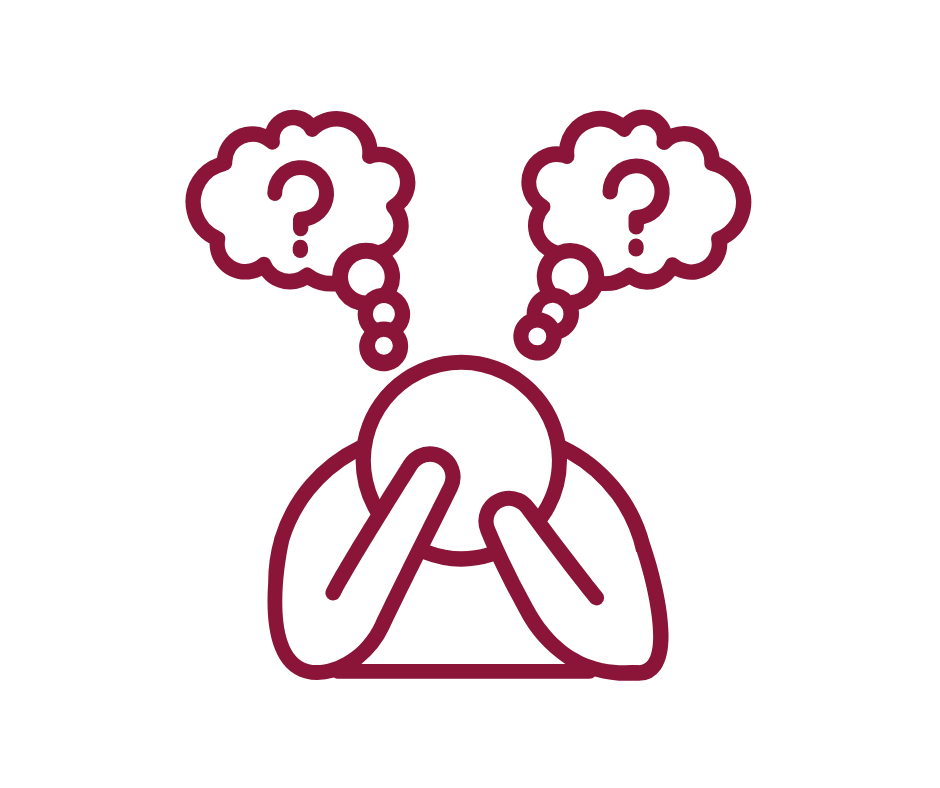 Sometimes there can be complications during pregnancy and afterwards, with yourself and/or your baby which can lead to perinatal trauma or loss. If you experience this, you may need both information and support.
Sometimes there can be complications during pregnancy and afterwards, with yourself and/or your baby which can lead to perinatal trauma or loss. If you experience this, you may need both information and support.
For some, trauma and loss will bring up emotions of shame and guilt, often leading to self-blame which can be difficult to manage on top of the other emotions you will be feeling. You may find you are looking for an explanation or a reason why this has happened. Often there is no identified reason or cause, or if there is, it may take a considerable amount of time to gain this.
It's important to understand that everyone processes experiences differently, and what is traumatic for some will not be for others. If you have experienced any trauma, complications, or losses it may also affect how you feel in future pregnancies. So having help from others who validate and understand will more likely create feelings of safety and peace at a time when you need it most.
Talk to the people close to you about how you feel, and to your midwife, doctor, or health visitor about what's happened and why. There is specialist support available such as bereavement midwives, and Birth Afterthoughts/Reflections. Birth Afterthoughts is a service that anyone can access to go through your birth notes and medical records with the support of a midwife, who is also available to answer any questions about your birth experiences.
Sometimes it is easier to talk to someone outside your family and friends. There are lots of organisations offering information and support, including The Lullaby Trust, Bliss, Miscarriage Association and The Birth Trauma Association. There are also specialist bereavement, counselling, and psychological therapy services within your local area where you can access support. Please see our signposting section for more charities and support services in your local area when you are ready to reach out for support.
Please remember you are not alone in your experiences and there will always be someone here to help you.
Don’t suffer on your own.
For more information and support if you have had a perinatal complication, trauma or loss please see the below websites/services:
- Bereavement midwives at United Lincolnshire Hospital Trust ULT, Rachel Bond.
- Sands | Saving babies' lives. Supporting bereaved families - stillbirth and neonatal death charity, helpline 0808 164 3332, local support groups and bereavement app.
- The Ectopic Pregnancy Trust - Support For You And Your Loved Ones - Support line 020 7733 2653, virtual support groups, live chat.
- The Miscarriage Association: Pregnancy Loss Information & Support - Miscarriage, ectopic or molar pregnancies, helpline Mon-Fri 0900-1600 01924 200799, live chat, support groups.
- Antenatal Results and Choices (ARC) | Support for Parents and Professionals (arc-uk.org) - Termination for medical reasons, helpline Mon-Fri 1000-1730 020 7713 7486, text service, ARC forum.
- The Mariposa Trust - Saying goodbye division for bereaved parents/loss offer befriending services and online forums of support, growing you division support for pregnancy after loss, holding hope division support for infertility, and love in every tear division offers support and information for other family members/friends supporting parents through a loss.
- Baby loss information and support | Tommy's (tommys.org) - Tommy’s in house midwives who offer free support and information for women and their families after baby loss and in subsequent pregnancies.
- Birth choices - ULTH consultant midwife, Yvonne McGraph will go through birth plans for women who are pregnant after birth trauma.
- Birth Trauma Association - support for parents after birth trauma, support line 0203 621 6338.
- Petals Charity | The Baby Loss Counselling Charity - Baby/pregnancy loss counselling, 0300 688 0068.
- Teddy's Wish Baby Loss Charity (teddyswish.org) - bereavement counselling charity.
- Lincolnshire centre for grief and loss- free counselling service. (lcgl.org.uk)
- Action on Pre-eclampsia - Supporting families affected by Pre-eclampsia (action-on-pre-eclampsia.org.uk)
- Pregnancy Sickness Support | UK Charity
- Gestational Diabetes UK • Gestational Diabetes UK
- Saving babies' lives - Charity for Babies | Tommy's (tommys.org)
- ICP Support
Your rights
Your rights in the perinatal period
Knowing and understanding your rights during your perinatal period can help to reduce some fears and anxieties that you may have.
Birthrights, (your human rights during pregnancy and maternity care) offer lots of information and advice on your human rights during pregnancy and childbirth. Mind, (About the Human Rights Act - Mind) offer information and advice on your human rights in relation to services that may be involved in your mental health care during the perinatal period.
Consent to treatment.
This means a person must give permission before they receive any type of medical treatment, test or examination. The practitioner should give you all the information about what the treatment involves, including the benefits and risks, and will allow time to make a decision. You can consent verbally, in writing, or nonverbally by your continual engagement with the service and treatment. You can withdraw your consent or change your mind at any time. You should not feel pressured to consent to a treatment.
Making decisions about your care and treatment
Many services are familiar with the BRAIN decision-making tool. Using the questions in the tool can help you to explore your options and feelings about a decision before you provide your informed consent.
B – Benefits. What are the benefits of the treatment being offered to me? These may be physical or emotional benefits. The benefit may to you, your baby or your family. To your health right now, or in the future.
R – Risks. What are the risks of the treatment being offered to me? These may be physical or emotional risks. The risk might be to you or to your baby and may apply to your health or in the future.
A – Alternatives. What is the alternative to the treatment that is being offered to me?
I – Intuition. What is my gut feeling about this treatment?
N- Nothing. What happens if I choose to do nothing? For example, if I do not choose the treatment offered to me, or any alternative.
Advocacy
Advocacy is about helping people to speak up for themselves, to make sure that their views, thoughts and opinions are heard and understood. Advocates should help people to:
- Think through different choices and options available to them
- Make their views and wishes clear
- Represent their views if they are unable to represent themselves
- Get independent and accurate information
- Understand their rights
- Challenge decisions that have been made about a person if they do not agree with the decision.
In Lincolnshire there are a variety of different advocacy services. All advocacy is free and independent of the Trust. Visit Advocacy for more details.
Accessing a second opinion
There is no statutory legal right to a second opinion. A healthcare professional should consider your circumstances and whether a second opinion is needed. If you would like a second opinion after seeing a consultant, you should discuss this with them.
Interpreting services
Where English is not your preferred language to speak, we can arrange an interpreter in your specified language. Where possible, we can get same day interpreters. If you require an interpreter, please request your allocated practitioner to arrange one for you.
Reasonable adjustments
The NHS has a duty to make it as easy for disabled people to use health services as it is for people who are not disabled. This is called making reasonable adjustments.
These could be things like:
- Making sure there is wheelchair access in hospitals
- Providing easy read appointment letters
- Giving someone a priority appointment if they find it difficult waiting in their GP surgery or hospital
- Longer appointments if someone needs more time with a doctor or nurse to make sure they understand the information they are given.
Many healthcare organisations use a Reasonable Adjustments Digital Flag. This digital red flag ensures that processes are in place to identify, record, flag, share, meet and review and update reasonable adjustment needs for individual service users. Speak to your service provider about this.
Viewing your records
You have the right to see most health records held about you. You’re entitled to know how the information is used, who has access to your records and how you can ask to see them. This can be done online or through your GP.
Complaints and compliments
We value your feedback in order to help us develop our services and ensure that we’re making a difference for you, with you. If you would like to provide your feedback please speak to a member of the team and request a patient feedback form. Anyone accessing LPFT services, their families and / or carers can contact the Patient Advice and Liaison Service (PALS) Phone: 01529 222265 Email: lpft.
Signposting - services and resources
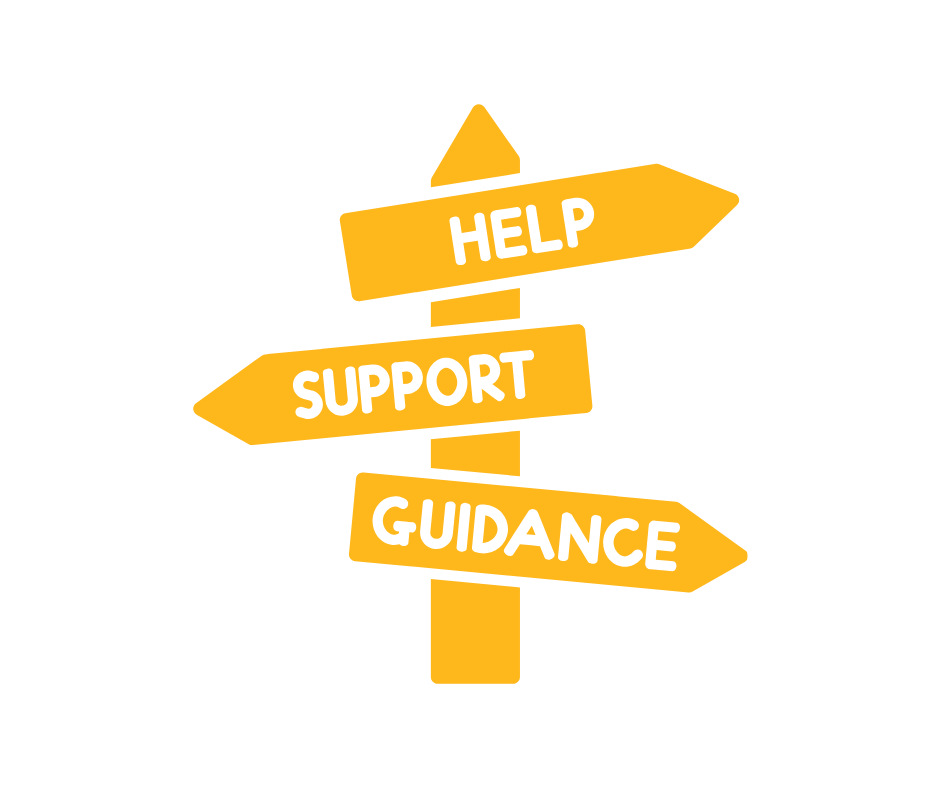
General mental health and wellbeing
- Mind.
- If you are already using LPFT mental health services, during office hours your first point of contact should be the person that you usually see (a care coordinator or named lead professional).
- For out of hours support, a local crisis team can help support you. They can be contacted via the Single Point of Access Team on 0303 123 4000 or email: Lincs.
spa .@nhs.net - If you have not used our services before, we would encourage you to speak to your general practitioner (G.P) who can refer you to the most appropriate mental health service.
- If you are feeling stressed, anxious, low in mood, depressed or have experienced/witnessed a traumatic event, you can self-refer to Lincolnshire Talking Therapies (previously called Steps2Change). You may find it beneficial to complete the self-referral form with one of our dedicated peer support workers present who can offer support and prompt with answers.
- If you have an immediate, life-threatening emergency requiring mental or physical health assistance. You should call 999 or go to A&E.
Perinatal mental health and wellbeing
- Local Specialist mental health midwives; speak to your community midwife or professional during your scan appointments.
- Action on Postpartum Psychosis | National charity supporting women and families affected by postpartum psychosis.
- Association of postnatal illness- Helpline 10am until 2pm 0207 386 0868, website with information and live chat function.
- PANDAS Foundation UK - Information and support for postnatal depression. Helpline open from 9am-8pm every day – 0843 2898 401.
- Baby Buddy app | Best Beginnings - NHS approved app.
- MWN Helpline UK - Muslim women’s network- helpline Mon-Fri 10am – 4pm with support offered in English, Urdu, Punjabi, Mirpuri, Putwari, Hindko, and Bengali- 0800 999 5786, live chat, text service, also provide a counselling service.
- Twins Trust | Twins Trust - Listening service for parents of twins, triplets and more. All the calls are answered by volunteers who have multiples themselves. Twinline is open Monday to Friday 10am to 1pm and from 7pm to 10pm. 0800 138 0509.
- Acacia Family Support | Prenatal Depression and Postnatal Depression Support Services | - Pre and postnatal depression support services, Birmingham based, but please see website for information.
- Health visitors- listening visits, baby massage, VIG.
- Birth afterthoughts - birth debrief.
- Maternity voices partnerships (General maternity, military and neonatal)- complaints and compliments for maternity services.
- Maternal Mental Health Alliance | Awareness Education Action - A charity that works with other organisations to raise awareness and provide information about maternal mental health.
Partners mental health and wellbeing:
- Dad Matters.
- How are you dad?
- Tommy’s dad's and partners.
- Fathers mental Health - Dr Meyers
- Post Partum Men.
- Birth Trauma Association.
- MANUP?
- This Dad Can.
- Acacia Family Support.
- Mablethorpe Men's Shed (mablethorpemensshed.co.uk) - New shed. Funded to improve the building and invest in some workshop machinery - mainly woodworking (men and women). Brian Norris. Old Lifeboat Station, LN12 2AQ
- Louth men's shed: Email: contact
@louthmensshed.org . Monday, Wednesday and Friday 10am until 3pm. Wood-working room, bicycle repair room, pain room, cut glass making. - PANDAS Dads - Closed Group | Facebook
- NHS talking therapies - If you live in England and are aged 16 or over, you can access NHS talking therapies services for anxiety and depression. You need to be registered with a GP to get talking therapies on the NHS. A GP can refer you, or you can refer yourself directly without a referral.
You can also speak to one of the dedicated mental health organisations and support groups such as:
- The Campaign Against Living Miserably (CALM) offer support to any man who is down or in crisis online, over the phone on 0800 58 58 58, or on webchat.
- The PND Daddy runs a Twitter chat for dads who suffer with PND and need support. Join in on Tuesdays 8-9pm using #PNDDaddies.
- PANDAS Dads have a private Facebook support group to help dads going through and anxiety and/or those who are supporting their partner with perinatal mental illness.
- Samaritans - Day or night, Samaritans are there if you need to talk. Call them on 116 123.
- SMS4dads gives dads information and connects them to online services by text. As well as this, every three weeks you get an interactive ‘How’s it going?” message.
Other
- Start for Life home - NHS - Pregnancy, baby and parenting.
- First Steps Nutrition Trust
- Find a children's centre – Lincolnshire County Council.
- How Are You Lincolnshire.
- National Breastfeeding Helpline.
- The Lullaby Trust - Safer sleep for babies, Support for families.
- Parents - ICON Cope - Infant Crying.
- Children's Health Service - Lincolnshire County Council
- Better Births Lincolnshire.
Worried about worsening symptoms?
If you are concerned that your partner’s condition is getting worse then please contact the Perinatal Mental Health Team on 01522 309540.
Please be aware that due to patient confidentiality, we may not be able to discuss all aspects of their care without their permission.
During out of hours, please call SPA instead on 0303 123 4000.

